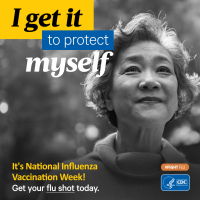
It’s not too late to get your flu shot. While the influenza virus is present year-round in the U.S., peak flu activity usually occurs between December and February. Get vaccinated in order to protect yourself and others. As the Covid-19 pandemic continues, it may be even more important to get the flu vaccine; lessening your likelihood of serious complications from the flu can help conserve health resources for critically ill patients due to Covid-19 and other diseases.
More information on resources:
- HSL’s Vaccines & Immunization library guide lists resources for clinicians who advise patients on recommended vaccinations.
- Use the CDC's VaccineFinder to find flu vaccines near you.
- The Seattle & King County Community Health Access Program (CHAP) helps local residents who are uninsured by connecting them to health insurance, health care services and other resources.
 Flu Hunter: Unlocking the Secrets of a Virus
Flu Hunter: Unlocking the Secrets of a Virus Pale Rider : The Spanish Flu of 1918 and How it Changed the World
Pale Rider : The Spanish Flu of 1918 and How it Changed the World
